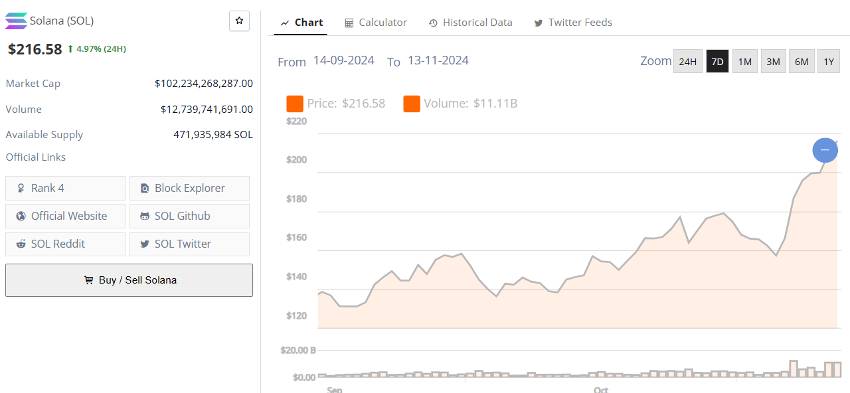Renowned privacy advocate and former NSA contractor Edward Snowden has renewed his attacks on Solana, a massive blockchain network, citing concerns about its reliance on venture capital (VC) funding and the dangers posed by AI-based surveillance technologies. .
Speaking at a conference in Bangkok, Snowden address the main issues facing the blockchain and cryptocurrency industries, with a focus on the dangers of centralization and the erosion of privacy.
Snowden has long denounced the risks associated with centralized control of decentralized systems. During his recent speech, he used Solana as a prime example of how venture capital involvement can undermine the fundamentals of blockchain. He described Solana as “born in prison,” referring to the network’s early financing model, which he said led to excessive centralization of power among investors.
While praising Solana’s rapid growth and promise, Snowden warned that the company’s reliance on venture capital leaves it open to the whims of a select group of powerful individuals. Many in the blockchain community say the growing involvement of venture capital firms is inconsistent with the principles of decentralization, and its concerns about Solana reflect those concerns. If a few major players gain excessive power, Snowden said, investor influence could quickly compromise the integrity of blockchain networks.
Edward Snowden talks about the importance of decentralization of cryptocurrencies
The Growing Threat of AI Surveillance
A significant portion of Snowden’s speech focused on the growing threat posed by AI-based surveillance. He painted a frightening picture of a future where governments and businesses will be able to monitor and analyze vast amounts of personal data in real time. Authorities could track people by combining AI with surveillance systems, identifying “ anomalies ” and potentially zeroing in on specific people based on their behavior patterns. Snowden said this type of surveillance could quickly spiral out of control and result in widespread and intrusive surveillance of ordinary citizens.
Snowden’s comments regarding AI-based surveillance reflect his concerns about the potential power disparities caused by the rampant development of AI technology. He emphasized that decentralization could serve as a defense against this type of control, providing a way to empower citizens and defend their independence from government or corporate influence.
To counter this centralization of blockchain networks and the broader technology industry, Snowden has rallied around open source tools. According to him, open source is “incredibly empowering” software that allows individuals to understand and master the technology they use. “At the end of the day, you can do it yourselves,” Snowden urged his audience. He emphasized that open source technologies are not only more transparent but also more accessible, allowing everyone to participate in building decentralized systems. He says this is essential to creating a safer and more equitable digital future.
The debate on Solana decentralization intensifies
While Snowden’s criticism of Solana garnered considerable attention, it also sparked a defensive response from some members of the Solana community. After Snowden’s remarks, which were widely shared on social media, several Solana supporters reacted, arguing that the network is not as centralized as it claims. Mert Mumtaz, co-founder of Helius Labs, disputed Snowden’s claims, urging critics to provide evidence of a single point of failure in Solana’s ecosystem.
Mumtaz also pointed out that while Solana may not yet be as decentralized as older networks like Bitcoin or Ethereum, it is still more decentralized than many Ethereum Layer-2 solutions. He rejected the idea that a single player could easily defeat Solana, pointing out that this is extremely implausible given the network’s enormous market capitalization.
The problem of Solana’s decentralization still exists despite these rebuttals, especially given previous conflicts over Solana’s ties to the now-defunct party. FTX Exchange. by Solana close relationship with FTX founder Sam Bankman-Fried, who had backed the network, drew criticism. Some say this relationship tarnishes Solana’s reputation as a truly autonomous initiative.
Edward Snowden first made comments about the centralization of Solana during his virtual appearance at Token 2049-a major crypto conference in Singapore in October 2024. During this Q&A session, Snowden criticized the network for sacrificing decentralization on the altar of speed and efficiency, which could easily making it disruptable once it becomes more widely adopted.

Solana (SOL) Price Chart. Source: Brave new piece
As of November 11, 2024, Solana’s price was $216.58, with a market capitalization of $97,652,740,184. The weekly technical chart shows the SOL Price creating a bullish reversal pattern known as a round bottom. This chart layout is generally considered the low point of a downtrend, with investors demonstrating an increase enthusiasm for purchase. Under the impact of this trend, buyers could target the all-time high resistance at $260, providing further evidence of resistance. bull market.

